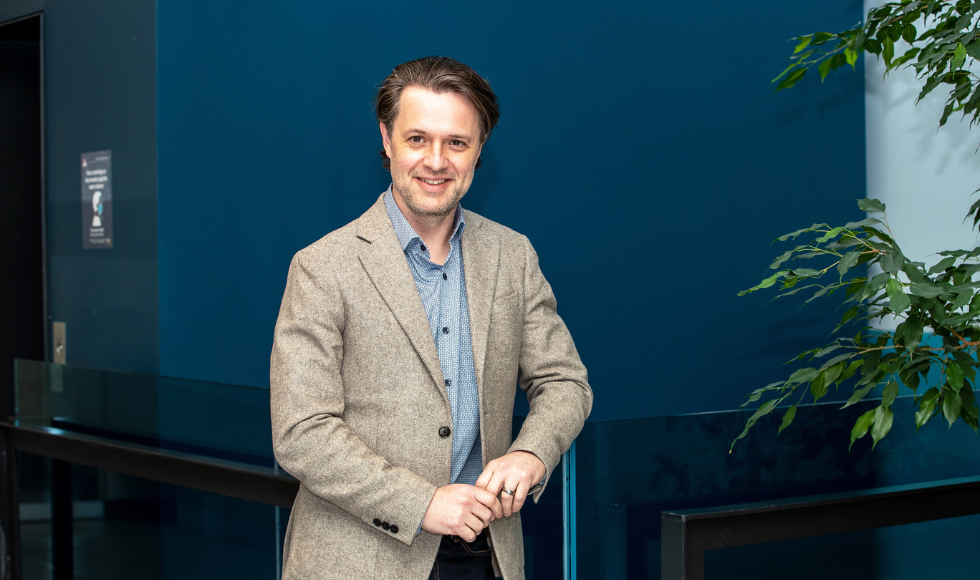AI and international recruitment: A Q&A with Deputy Provost Matheus Grasselli

Deputy Provost Matheus Grasselli talks priorities, goals — and surprises — as he looks to the year ahead.
Matheus Grasselli has big plans for 2024.
Eighteen months after becoming McMaster’s inaugural deputy provost, Grasselli talks with us about his focus for the year ahead, the importance of pivoting when important issues arise, and some pleasant surprises in his new role.
One of your primary portfolios is the Office of the Registrar. What is a key priority for 2024?
International student recruitment is crucial for the university. In the past few years, there has been a change in international markets with increased competition from around the world, and this means how students select universities has also changed. We are entering a phase where it’s essential to go into international recruitment with a well-defined vision and strategy. My role as deputy provost will see me work with the Office of the Registrar, Faculty teams, the Office of International Affairs, and Communications, Marketing and Public Affairs, in the new year to generate a unified approach to boost international student recruitment.
As an update, we have a national search underway for McMaster’s next University Registrar. I hope to have a new senior leader in place during the upcoming spring term.
The evolution of artificial intelligence (AI) is a big part of your work this year. How did you work to pivot as this issue came to the forefront?
The Task Force on Generative AI in Teaching and Learning that I co-chaired with Kim Dej, vice-provost, Teaching and Learning, was one of the most rewarding projects for me in 2023. As an academic institution, we needed to efficiently pivot to understand the pros and cons of this technology, and provide the campus community with clear direction. As a result, the Provisional Guidelines on the Use of Generative AI in Teaching and Learning were released in June 2023. A priority for 2024 is working with other leaders on campus to establish a permanent advisory group on generative AI and its impacts on teaching and learning, research and the workplace.
The Office of Faculty Leadership and Development is another team under your guidance. What can we expect from this office?
We were excited to recently launch a Faculty Leadership and Development Resource Hub that serves as a centralized online resource for the wide range of workshops and events we do to help faculty members. We’re also proposing the new Organizational Leaders training program that we’ve developed together with human resources. This is the latest in our multi-level approach to leadership training, available to faculty members and staff who work together in leadership across the university. I am happy to say this project has been approved by the provost, so we’ll be moving to the implementation, with the 2024-25 academic year welcoming the first cohort of this new training program.
You mentioned you have forged many important working relationships during your first year-and-a-half as deputy provost. Can you share an example?
This year, I was very involved in the joint committee between the McMaster University Faculty Association and university administration. This committee impacts all aspects of faculty life at the university, such as teaching, research, working conditions and policies. Maintaining a productive working relationship with the faculty association is something I am proud to have been part of and that I am committed to continuing in 2024.
Mentorship produces and shapes great leaders. Who has been your mentor?
Prior to taking on the deputy provost position, my most influential mentor had been Dean Maureen MacDonald from the Faculty of Science, who gave me ample opportunities to develop as chair of the Department of Mathematics and Statistics and encouraged me to pursue higher administrative positions. In my new role, I’d say my closest mentor has been Provost Susan Tighe. As someone who has previously served as a deputy provost at another academic institution, she has helped me understand and shape this role while still making my own mark. She has been a great supporter and mentor. I have also benefited from insight and conversations with other McMaster deans and vice-provosts, especially Kim Dej. Our portfolios overlap the most, and I have learned a lot from her on how to put forward a vision and make it a reality.
What has been one of the highlights of serving as deputy provost?
I represent the provost on the advisory committee for the McMaster Museum of Art. The museum serves as a place where the community and university intersect, with different exhibitions and artists’ talks. The advisory committee allows me to be a part of advancing museum’s mission of engaging the community through innovative and imaginative research, dismantling institutional boundaries and advancing de-colonization. This part of my job has been an unexpected joy and really, a bright light.
How do you spend your time outside of the office?
I like to cook – mostly Italian food, spend time with my family and friends, and exercise, especially running and high intensity interval training, sometimes in a hot yoga studio! I enjoy cycling and often arrive at provost council meetings still wearing my bicycle helmet. I also like to travel for work and for fun.


